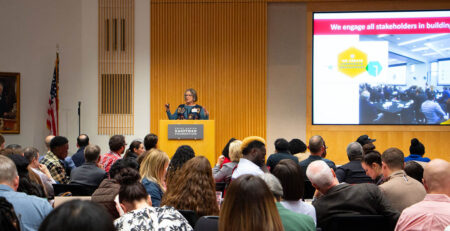How Business Certification Can Help You Reach the World’s Largest Consumer
Photo: Joe Vazquez of Vazquez Commercial Contracting in Kansas City, Missouri, has experience with an 8(a) certification and a HUBZone certification.
If you’re looking to give your business an edge or want to do business with corporations or government entities (the U.S. federal government is the world’s largest consumer of products and services), certification can help bring visibility to your company. It can help the organizations that want to work with you find and vet your venture. And as big businesses focus on corporate engagement, these relationships can mean new revenue, market knowledge and independence from external capital for small businesses.
SCORE KC recently hosted a workshop all about certification – the who, what, where, when and why. Consultant Mary Shannon of Connectus Worldwide shared insight from years of helping businesses reach these milestones and connecting small businesses to larger companies that are looking to do business with diverse small suppliers. Here’s what you can learn.
What’s business certification?
Certification is a tool that can help your business build relationships with corporate and government entities. It’s a way of authenticating that your business meets certain requirements.
Federal, state and local entities can offer certifications. Some nationally recognized third-party organizations certify businesses as well. But getting a certification isn’t just checking a box and watching the new business roll in.
“Certification is like getting a college education – once you get that, it doesn’t stop,” Mary says. “You have to go out, network, join clubs. It’s the same thing with certification. You must leverage it.”
What are the benefits of business certification?
Supplier diversity is a hot topic. It’s the process of identifying and integrating vendors from different backgrounds into corporate strategy. Many corporations and government entities are focusing on building a diverse supplier base.
“Everyone wants to know what a business stands for,” Mary says. “Supplier diversity is a way to make that happen.”
Being certified means your enterprise is a legitimate diverse business. This can give you access to corporate and government contracts that are limited only to certified businesses. It can also give you access to capital through the Small Business Administration guaranteed loan program.
Certification shows that you’re committed to your business and your customers. It doesn’t make money fall from the sky. But it’s a tool in your business toolbox.
What groups can get certified?
Certification is available to businesses owned by and led by people who are:
· Black or African American
· Hispanic American
· Asian-Pacific American
· Native American
· Women
· Veterans
· LGBTQ
For a business to be eligible for certification, the owners or leaders must be U.S. citizens or permanent residents. They must also possess at least 51% ownership, management and control of the company. The business must be physically located in the U.S., and it must be a for-profit entity.
What are the types of business certification?
With government agencies and third-party organizations offering certifications, there are many options to choose from. A business can have multiple certifications. And which ones are right for you depend on the location, services and goals of your business.
It’s important to do your homework. States and cities have their own certifications. But here are some of the nationally recognized certification programs that you’ll see often:
· 8(a) Small Business: Certified by the SBA
· Disadvantaged Business Enterprise (DBE): Administered by the U.S. Department of Transportation
· Historically Underutilized Business Zones (HUBZone): Certified by the SBA
· LGBT Business Enterprise (LGBTE): Certified by the National LGBT Chamber of Commerce
· Minority Business Enterprise (MBE): Certified by the National Minority Supplier Development Council
· Service-Disabled Veteran-Owned Small Business (SDVOSB) and Veteran-Owned Small Business (VOSB): Certified by the U.S. Department of Veterans Affairs
· Small Disadvantaged Business (SDB): Certified by the SBA
· Veteran-Owned Business Enterprise (VBE): Certified by the National Veteran Business Council
· Women-Owned Small Business (WOSB): Certified by the SBA and the Women’s Business Enterprise National Council
This might look daunting, but you don’t have to go it alone.
What’s the process to get my business certified?
Every certification has different rules and a unique process. Some VOSB certifications allow for self-certification. At the other end of the spectrum, the SBA’s 8(a) certification is a nine-year process.
Even though each procedure is different, it should start with business owners identifying their target market. Then, figure out what that market needs and how your business is uniquely able to fit that need. From there, look for certifications that will help differentiate your business in those marketplaces.
You have a few options for working through the certification process:
· Research certifications and find your way through the process yourself.
· Contact the Missouri Procurement Technical Assistance Center for federal, state and local government certifications at no cost.
· Hire a consultant who specializes in certifications to streamline the application process.
· Work with a mentor who can provide guidance.
Every business is different, and there’s no one-size-fits-all solution. Take an honest look at your situation and goals. And take advantage of the robust resources available in the Kansas City business community.
Future workshops and events to fuel your business
The Kansas City entrepreneurial ecosystem is chock full of opportunities for learning, networking and growth.
KCSourceLink’s event calendar lists programs, classes and happenings in the Kansas City area. Search for events in your neighborhood, industry or interest. Our Resource Navigator will help you find the organizations that can help you find the knowledge and know-how to move your business forward.
And if you’re not sure where to start? Let our seasoned Network Navigators create a Personal Action Plan just for you. This free, individualized checklist will give you a starting point for meeting your business goals and outline which of Kansas City’s 230+ entrepreneur-focused nonprofits can help move your idea or established business forward.





Leave a Reply